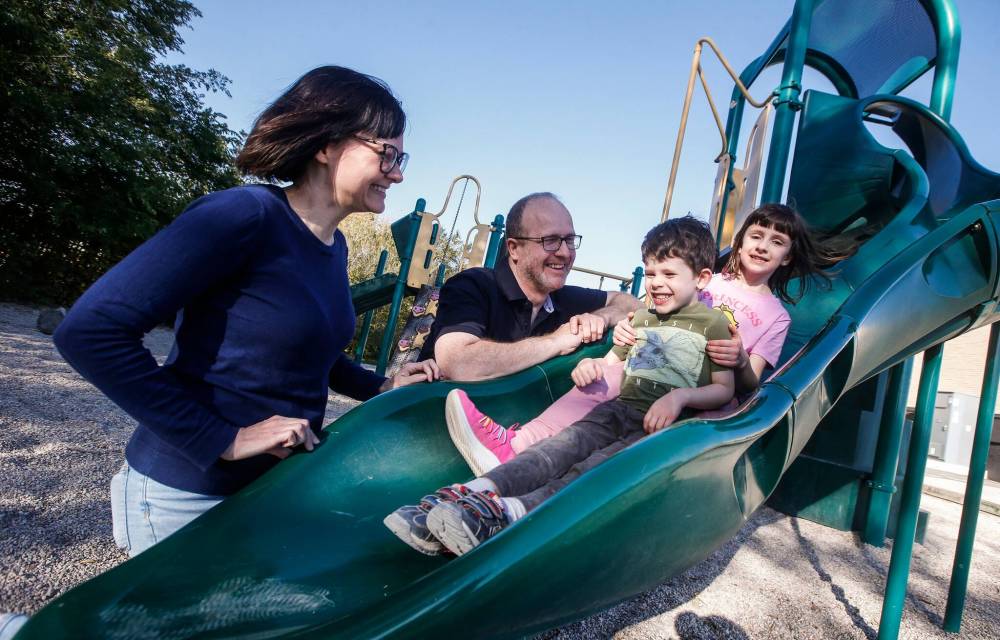Families are fretting about the future of a one-of-its-kind public school program in Winnipeg that has immersed students in the German language for 40 years.
A group of parents have revived a non-profit dedicated to the River East Transcona School Division’s German bilingual program amid a crackdown on catchment lines and an administrative review.
“The goals are: keep it alive because it might get shut down altogether, (ensure) kids who are in the program should be able to finish and increase accessibility,” said Angela Schellenberg, a member of Manitoba Parents for German Education.

JOHN WOODS / FREE PRESS
Angela Schellenberg with her husband and their children Anna and Henry who are in the River East Transcona School Division’s German bilingual program.
The advocacy group originally founded in the 1980s by Schellenberg’s father, former Rossmere MLA Harry Schellenberg, had long been inactive. A renewed version of it has grown to include about 100 members since the start of the school year.
“It feels like it’s being dismantled, piece by piece,” retired teacher Charlotte Rempel Kroeker said about the program she helped deliver for 23 years.
“If (decision makers) truly support this program, they should be inviting people in — not excluding people.”
The apparent rebranding of River East Collegiate’s German program as well as rejections of students living out of direct catchment wanting to enter or progress to the next immersion level have sparked concerns among supporters.
Up to 50 per cent of the school day is taught in German in designated classes at Princess Margaret School, Donwood School and Chief Peguis Junior High School.
High school participants receive support to complete an international test that, if they pass, makes them eligible to study university in Germany, where tuition is free.
Despite living and working as a general surgeon in Selkirk, Schellenberg said she wanted to register her eldest in the specialty stream to instill pride in her identity and carry on a family tradition. The mother of two, who is of German-Mennonite ancestry, graduated from the program.
Schellenberg had planned on her youngest joining his sister, who is now in Grade 2 at Donwood School, so he could also reap the benefits of bilingual education.
Instead, her children now attend different schools in different cities. An unexpected spring rejection letter cited her kindergartner’s out-of-division residence.
She said she has considered moving — something two other parents involved in the program told the Free Press they have done in recent months to maintain eligibility.
“It’s a total schmozzle,” Schellenberg said, adding attempts to schedule a group presentation for the board of trustees have proven unsuccessful to date.
Superintendent Sandra Herbst was not made available for an interview on Tuesday.
The division issued a statement on her behalf that stressed “unprecedented” enrolment growth — the addition of 1,782 new students over the last three years — has created capacity challenges and impacted schools-of-choice applications of all kinds.
Herbst said all local students who have registered for K-12 English-German bilingual programming have been enrolled. The program is under review, per standard processes, she said.
“Though we empathize with the circumstances of the families who reside outside of the RETSD boundaries and wish to attend schools in our division, our commitment remains in the provision of progressive, robust programming to the students whose families live in RETSD,” she said.
Ryan Wiebe put his Glenelm house up for rent and secured a last-minute rental in Narol over the summer so his son could proceed to the middle years level with his friends.
Wiebe said he respects the division’s right to enforce catchments, but argued it does not make sense to disrupt a child’s education when they’ve already spent years in the program.
“It’s absolutely tragic to not include everyone that wants to be a part of such a unique program,” Sara Sawatzky, a Grade 12 student who has taken German throughout her schooling career, said via text.
The 16 year old penned a letter to RETSD administration last year to tout the importance of continuity in the program and voice her concerns about students being left out.
German is the third most popular non-official language in Manitoba, following Tagalog and Punjabi, according to the 2021 census.
maggie.macintosh@freepress.mb.ca

Maggie Macintosh
Education reporter
Maggie Macintosh reports on education for the Free Press. Originally from Hamilton, Ont., Maggie was an intern at the Free Press twice while earning her degree at Ryerson’s School of Journalism (now Toronto Metropolitan University) before joining the newsroom as a reporter in 2019. Read more about Maggie.
Funding for the Free Press education reporter comes from the Government of Canada through the Local Journalism Initiative.
Every piece of reporting Maggie produces is reviewed by an editing team before it is posted online or published in print — part of the Free Press‘s tradition, since 1872, of producing reliable independent journalism. Read more about Free Press’s history and mandate, and learn how our newsroom operates.
Our newsroom depends on a growing audience of readers to power our journalism. If you are not a paid reader, please consider becoming a subscriber.
Our newsroom depends on its audience of readers to power our journalism. Thank you for your support.